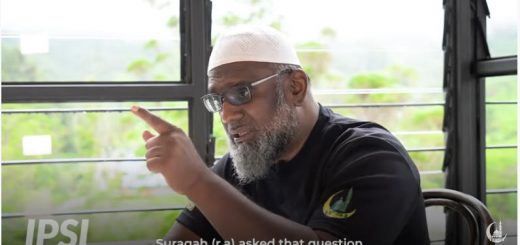IN THE SHEB ABI TALIB
Weeks and months had passed, and the people of Hashim lived in misery and hunger. The ban was so rigorously enforced that the Prophet’s peace be upon him clan was reduced to eating acacia leaves and the cries of hungry children reverberated all over the valley. The caravans passed peacefully through the streets of Mecca but the Quraysh told the merchants not to buy from or sell anything to the two forsaken clans. This resulted to the prices being pegged so high that it was extremely impossible for the beleaguered people to purchase even their basic necessities.
The decree of proscription lasted for three years and for the same number of years Bani Hashim and Bani Abdul Muttalib lived in exile and endured the hardships of a blockade. But not all Quraysh people were utterly humiliated and deprived. Those of them who were good-natured and kindhearted occasionally supplied food secretly to those who are in exile. However, the Prophet peace be upon him never ceased preaching the message he had brought to his own people and even towards others, whenever he got the opportunity. Bani Hashim on their part, endured every trouble with exemplary patience and fortitude.
ANNULMENT OF THE DECREE
The pitiable condition of the exiles gave rise to a feeling of resentment against the ban confronting the gracious and genial sons of the desert. Hisham Ibn Amr Ibn Rabia took the initiative to end the boycott. He was amiable and kindhearted, as well as highly esteemed by the Quraysh. He approached some other considerate and well-disposed persons and put them to shame for allowing tyranny to linger on. At last, Hisham, supported by four other persons agreed to stand together till the decree of boycott was cancelled. Then, when the Quraysh had assembled in the sanctuary, Zuhayr whose mother Atika was daughter of Abdul Muttalib, cried out to the people, O ye people of Mecca, shall we eat and drink while Bani Hashim should die of hunger, unable even to buy or sell? By God I will not take rest until this cruel and unjust decree is torn into pieces.
Abu Jahl tried to intervene but found everybody against him. Mutim Ibn Adiy then went up to tear the document into pieces but discovered that with the exception of the words In Thy name, O Allah the rest of the document had already been eaten up by white ants. The Prophet peace be upon him had already told his uncle, Abu Talib, that God has given the white ants power over the document.
The blighted document was, however, taken out and thrown away and thus ended the boycott and everything that was written on it. (Ibn Hisham, Vol. I, pp. 350-51)
The Lessons and examples can be taken from this period as follows:
If Allah intends to guide a man to make a call to righteousness and reformation, then Allah will fill his heart with hatred for whatever is corrupt and deviant within his society.
Muhammad peace be upon him was neither seeking prophethood nor was he dreaming about it. Allah used to inspire his heart to seek seclusion in order to worship and purify his soul, and to prepare his spirit to carry out the duties of the message. If Allah’s Messenger peace be upon him was seeking for it, he would not have been frightened when it came to him. When Muhammad peace be upon him came from the mountain in order to ask Khadijah (May Allah be pleased with her) about the incident, which took place in the cave, he was not assured that he was a Messenger until he saw Gabriel and heard him say, “O Muhammad, you are Allah’s Messenger and I am Gabriel.” Waraqah ibn Naufal and Khadijah (May Allah be pleased with her) assured him that what he saw in the cave was the same revelation as that which came to Moses peace be upon him.
If the reforming movement is strange for the majority of the people due to their attitude and system of belief, it is recommended that the caller does not make the call public until a number of the people believe in it and are willing to sacrifice everything for its sake. This is so because if the originator of the movement is harmed, his believers can succeed him and fulfill the duty of the caller, thus guaranteeing permanency.
Allah’s Messenger peace be upon him surprised the Arabs with something unfamiliar, thus they objected to it vehemently. Their primary concern was to put an end to the Prophet peace be upon him and his companions. This is a historical refutation to those who claim that Muhammad peace be upon him was a preacher of nationalism and that he represented the hopes and aspirations of the Arabs at that time. This is a ridiculous claim because the historical events belie this notion, as we have witnessed. Those who made such remarks were simply biased in their nationalistic views and this led them to claim that Islam was a matter that originated from the Arabs and their thought. This is a clear denial of the prophecy of the Messenger peace be upon him and an insult to the message of Islam.
The resilience of the believers, even after the evildoers and those who were astray tortured and persecuted them, is evidence of the truthfulness of their faith, the sincerity of their belief and the loftiness of their spirits and souls. They had comfort in their conscience and tranquility in their souls and minds. Also, they hoped for Allah’s pleasure which was more valuable to them than the torture, persecution, and deprivation which their bodies sustained. The power of truthful believers and sincere workers will always and forever be from the spirit, not the body; they hasten to achieve the needs of the spirit and they do not care about the needs of rest, hunger or material pleasure. In this way, the caller becomes victorious and multitudes of men are freed from darkness and ignorance.
The phrase, which the Prophet peace be upon him uttered to his uncle and his rejection of the offer of the Quraysh, is evidence that the Prophet peace be upon him was truthful in his proclamation of Allah’s message and his desire to guide the people to the straight path. In the same way, the caller must be persistent and determined with their call no matter how gravely the wrongdoers oppose them. They must turn away from their temptations of honor and positions because the adversities disputing the path of truth should bring comfort to their consciences and hearts. Furthermore, Allah’s pleasure and His paradise should be more valuable to them than the entire honor, positions, and wealth combined in this world.
It is incumbent upon the caller to meet on a regular basis, weekly or daily, with his followers to increase their belief in his message and to teach them its manners, ways and methods. If he should fear for himself or his people about meeting in public, then he must do so in secret. For if the wrongdoers learn about it, they might be able to execute all of them or increase their torture and persecution all the more.
It is necessary for the caller to be concerned about his relatives and deliver to them the message. If they turn away, Allah and the people will excuse him from his relatives’ renunciation of the faith, which may be instrumental to their continued corruption and deviation.
It is dependent upon the caller, whether he should allow the lives and beliefs of his people to be endangered, or to prepare for them a place where they will be safe from the enmity of the wrongdoers. There is no contradiction in this and the fact that the reformers must be willing to sacrifice because if they were a minority, the wrongdoers would be able to persecute or execute them, thus seizing their movement. Hence, their settlement in another location guarantees the continuity of the movement.
The order of the Messenger peace be upon him to his companions (May Allah be pleased with them) concerning the first and second emigrations to Abyssinia is an indication that the ties among religious people, even if their religions are different, are stronger and more reliable than their attachment to the pagans and atheists. The revealed religions, in their authentic and agreed upon sources and principles, adhere to upon the greater social objectives in the same way that they are in agreement concerning belief in Allah, His Messengers and the Last Day. This makes the relation between them stronger than any bond based on family ties, blood or country between the believers and the pagans, atheists or disbelievers in Allah’s legislation.
The wrongdoers do not surrender easily to the people of the truth. Whenever they fail at one respect in toppling or resisting the movement of truth, they switch to another method. This process continues until truth gradually gains victory while falsehood gasps its final breath.














